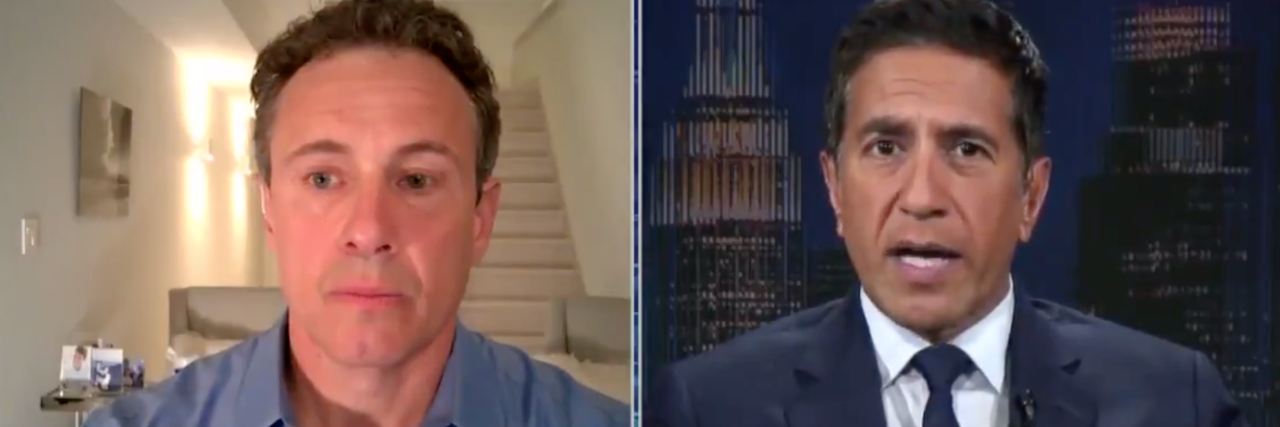On March 30, CNN news anchor Chris Cuomo tested positive for COVID-19, the new-to-humans viral strain in the coronavirus family leading to symptoms like shortness of breath, fever and dry cough. Recently, in an interview with Dr. Sanjay Gupta, Cuomo spoke about his symptoms, as well as his feelings about contracting the virus.
“I’m a metaphor for the country,” Cuomo told Gupta. “I’m ready to get out of the basement. I’m sick of being sick. I’ve had it! I want to get back to work.”
.@chriscuomo shares an update on his own battle with coronavirus:
“I’m ready to get out of the basement. I’m sick of being sick. I’ve had it. I want to get back to work. But I’m not ready and I don’t have a plan to be ready.” https://t.co/hxZmIKRlAW pic.twitter.com/H5vzjdj9KV
— Cuomo Prime Time (@CuomoPrimeTime) April 14, 2020
His statement, “I’m sick of being sick” is something most of us with chronic illness can relate to. Cuomo’s frustration at his situation, the limitations of his body and the restrictions placed upon him are things familiar to us, especially during this crisis.
For the past several years, I have lived with chronic illness and a disability. When I first got sick, I was constantly frustrated while learning the limitations of my “new normal.” I had difficulty adjusting to life with chronic illness and disability. The things I had taken for granted and the limits to which I pushed myself physically were no longer possible, and I struggled with that (sometimes I still do).
The emotional impact of living with an illness is real. In her piece about the emotional toll of being chronically ill, Mighty contributor Naomi G. wrote,
I think the emotional aspect of being chronically ill is the most invisible and sometimes the worst aspect.
It really is hard to sum up, especially to able-bodied people, how emotionally overwhelming being chronically ill is. I find myself getting frustrated trying to find the right words to get across what it is I want to say about the emotional toll of being chronically ill.
You become sick and tired of being sick and tired. And there’s no let up; no days off; no hours or even minutes where I’m symptom free. Being ill and disabled is my full-time job and it’s a job I didn’t choose and one I can’t resign from.
Right now, able-bodied people like Cuomo are contracting COVID-19 and learning in real time that their bodies require them to work differently. In the interview, Cuomo said being in quarantine feels “maddening.” Ultimately, Cuomo’s message was to advocate for staying home and staying connected to those less fortunate who are impacted by the stay-at-home orders and quarantines.
We are all under stress as we try to function in this new COVID-19 world. The stay-at-home orders and regulations to keep people from spreading the virus (or in my case, catching the virus) can lead to further “maddening” frustration. As Cuomo also mentioned, the emotional and psychological toll this is taking on people is not to be ignored. Listing depression, brain fog and edginess, Cuomo said, “It is in my head…It messes with your head.”
While he will eventually get better and move on with his life, many people with chronic illness will have to deal with feeling sick and isolated long after the pandemic is over. No wonder living with a chronic illness puts us at a higher risk for depression and even suicide.
If developing chronic illnesses and disability has taught me anything, however, it is the ability to adapt, cope and find your daily joy. By connecting with people who had been living with chronic illness and disabilities far longer than I had, I learned to create new goals for myself and experience the world in different ways. I learned my body was still remarkable and that she could still do amazing things. And I, like so many in my community, learned to adjust and adapt and make the best of my situation. This is what I want to remind everyone that we must do.
For my family, it means spending time with four-legged friends, reading scripture, cuddling with boos and rediscovering old hobbies.
For my students (who are all adults and nontraditional students), this can mean learning mindfulness techniques, how to cook for the week and how to “dance it out” Shonda Rhimes style.
For those in my disability community, it can mean breathing, creating a new routine, prioritizing connectedness and cherishing chosen family.
For the Chris Cuomos of the world, adjusting to a new normal and passing the time might mean reconnecting with family and friends, resting, journaling, meditating and creating a new routine.
We are all working to create our new normal. Remember, it’s OK to be frustrated. To Chris Cuomo and others like him who are “sick of being sick,” I say this:
While we all understand that you are frustrated, try to be more aware of differently abled people and people living with chronic illness whose experiences are separate, but no less significant, than your own. Try to be mindful of others whose illnesses prevent them from fully participating in society (even before COVID-19). Make sure you try to see everyone.
Concerned about coronavirus? Stay safe using the tips from these articles:

